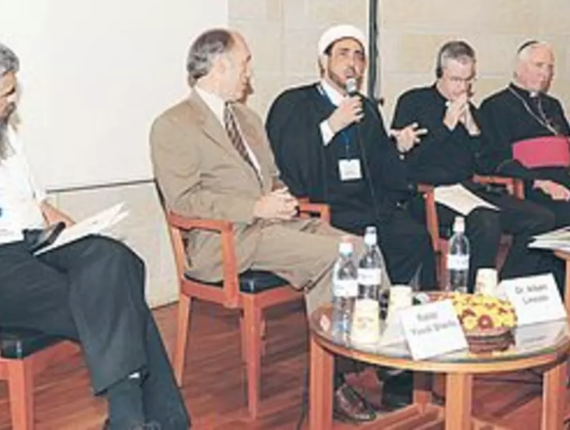
The Jerusalem Post
By Marc Schneier
Last March, in the wake of the killings in Toulouse, large numbers of French Muslims took part in interfaith demonstrations.

Earlier this week, Israeli Public Diplomacy and Diaspora Affairs Minister Yuli Edelstein unveiled a report on worldwide anti-Semitism which shows an alarming rise in anti-Jewish incidents during 2012, including violent attacks on Jews by Muslims.
The study, released in conjunction with International Holocaust Remembrance Day, found an increasing number of attacks on Jews and Jewish institutions worldwide – many of which were carried out by adherents of groups identifying with extremist Islamist ideology or with the radical Right.
The report came alongside the printing of the deeply disturbing cartoon in the London Sunday Times depicting Prime Minister Binyamin Netanyahu in manner all too reminiscent of the blood libels we had hoped were a thing of the past.
These developments are only the latest to highlight an ominous trend toward greater violence and hatred directed against Jews in Diaspora communities. Recent reports reveal that the number of anti-Semitic incidents in 2012 was 45 percent higher than the previous year. A separate report in October of 2012 showed that France had the most hate crimes against Jews in 2011 with 114, followed by the United Kingdom with 105, Canada with 68 and Australia with 30.
The most horrific of the attacks highlighted in the 2012 report released by Edelstein took place in Toulouse, France last March, in which a 23-year-old French Muslim named Mohammed Merah opened fire at a Jewish day school, killing three schoolchildren and a rabbi.
THE TREND of a rise in violent attacks on Jews by Muslims in Europe and around the world is deeply disturbing, and must not be ignored in the supposed interest of bettering Muslim-Jewish relations.
Yet even while vowing to do everything within our power to prevent such attacks, we should not overlook the fact that there has been a countervailing trend of great significance.
In an ever-increasing number of countries, especially in Europe and North America, Muslim leaders have been speaking out against anti- Semitic attacks by Muslims and vowing to stand together with their Jewish counterparts in opposing anti-Semitism and Islamophobia.
The willingness of European Muslim leaders to speak out publicly against violent anti-Semitic attacks carried out by their co-religionists began in the United Kingdom in January 2009, when in the wake of an upsurge of attacks on Jews by Muslims during the Israel-Gaza war of that year, more than 20 prominent British Muslims, including some of the UK’s leading theologians, imams, writers and community activists signed a joint letter denouncing anti-Semitic attacks and called for continued Muslim vigilance against anti-Semitism.
Last March, in the wake of the killings in Toulouse, large numbers of French Muslims took part in interfaith demonstrations and candlelight vigils in Paris, Marseilles, Nice, Lyon, Strasbourg, Grenoble, Bordeaux, Dijon, Lille and other cities to denounce Merah’s evil act.
Major French Muslim organizations, including the French Council of the Muslim Faith and the Great Mosque of Paris strongly condemned the attack as being antithetical to the fundamental precepts of Islam.
Indeed, the willingness of Muslim leaders in European countries to forcefully denounce attacks on Jews has gone hand in hand with a corresponding decision by many of the same leaders to form trans- Europe alliances with the Jewish community to stand together against anti-Semitism and Islamophobia and to oppose legislative and legal initiatives in Germany, Netherlands and other countries to prevent Jews and Muslims from practicing rituals basic to both faiths, including male circumcision and ritual slaughtering.
One of the most important manifestations of this trend has been the Gathering of European Muslim and Jewish Leaders, which has held two conferences, in Brussels in 2010 and Paris in 2012; each attended by more than 70 Muslim and Jewish leaders from countries across the Continent.
As in the United States and Canada, increasing numbers of European Muslim leaders have made visits together with Jewish counterparts to former Nazi death camps like Auschwitz; where they have made strong statements against Holocaust denial; particularly by representatives of Iran, Hamas and others within the Muslim world. In a compelling gesture of reconciliation, 15 French Muslim leaders followed the lead of 10 American Muslim leaders in sending an open letter to the chairman of Hamas, Khaled Mashal, urging that Israeli prisoner of war Gilad Schalit, who had been held as a prisoner by Hamas for more than five years, should be released on humanitarian grounds. Schalit was released just over a month after the letters were dispatched.
In short, while the growing number and growing violence of anti-Semitic attacks in Europe and around the world is a deeply troubling phenomenon that must be exposed and combated, let us not overlook the increased willingness of Muslim leaders to denounce attacks on Jews and to stand with Jewish leaders against religious bigotry. In fact, ongoing efforts to strengthen Muslim-Jewish relations in Europe and around the world play an indispensable role in overall efforts to protect the security and well-being of Jews in countries with large and growing Muslim populations.
The writer is president of the Foundation for Ethnic Understanding. He is co-authoring a book entitled Sons of Abraham with Imam Shamsi Ali, the spiritual leader of the Jamaica Muslim Center, New York City’s largest mosque, which will be published this September by Beacon Press.
Copyright © 2025 Foundation For Ethnic Understanding. All rights reserved. | Privacy Policy